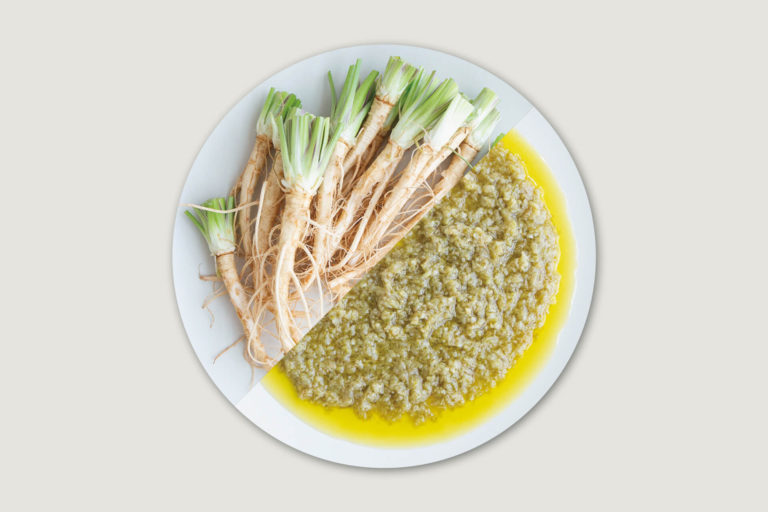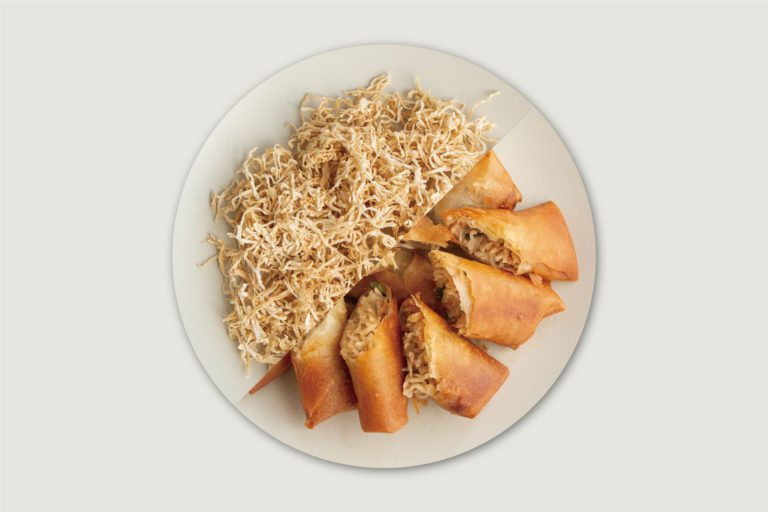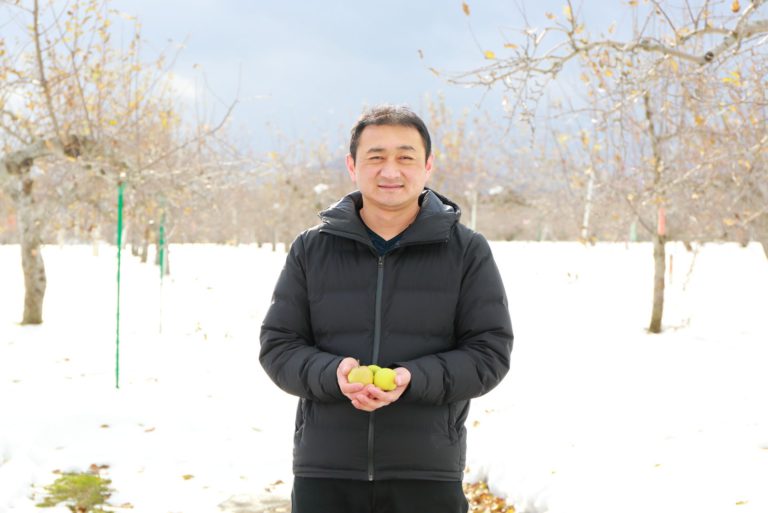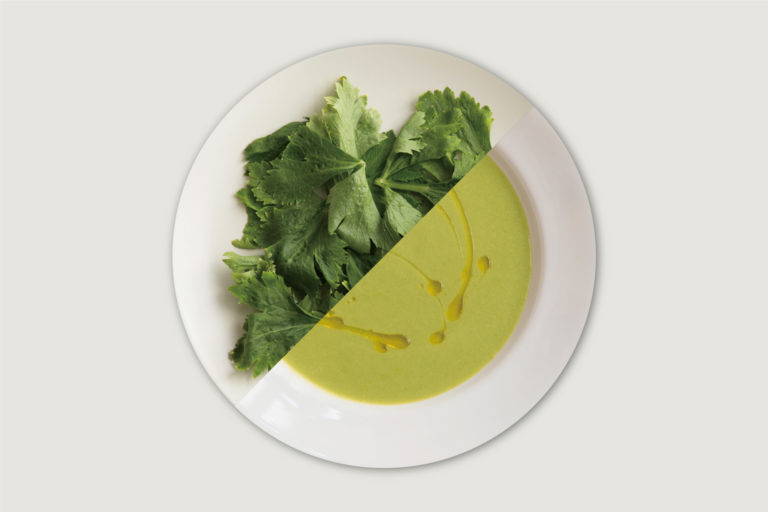Things We Can Do
to Avoid Wasting
Finite Food
to Avoid Wasting
Finite Food
Since 2014, SHUNGATE has interviewed food producers throughout Japan to showcase the country's food culture.
The rich food culture we enjoy daily was spun together over the years by the people who produce the food and those who eat it.
Meanwhile, we are discarding vast amounts of food. If we continue to waste food, we could harm the environment and cause a food crisis.
THINK&EAT will feature individuals, initiatives, and products that seek to solve the problem of food waste and convey the thoughts and ideas behind them.
Let us think about our approach to food. We hope THINK&EAT will give you some tips.
-
Project
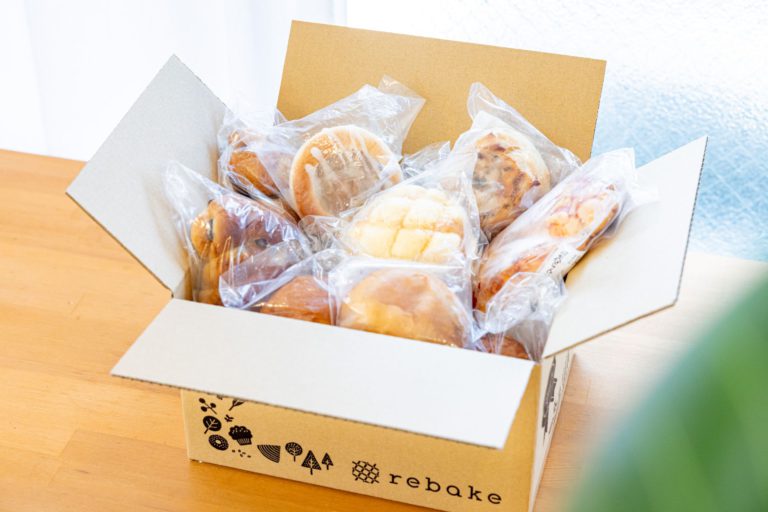 “rebake”: Discover Bakeries Across Japan while Saving Unsold Bread"rebake" was born from the desire to rescue bread from going to waste. It's a service that ships frozen unsold bread from more than 1,500 bakeries across Japan. Not only do you get to enjoy bread from shops you've never visited, but you also help prevent food waste, making it a win-win for everyone. We spoke with Yuya Saito, the representative of Quagga Inc, the company behind "rebake," to learn more about the service.
“rebake”: Discover Bakeries Across Japan while Saving Unsold Bread"rebake" was born from the desire to rescue bread from going to waste. It's a service that ships frozen unsold bread from more than 1,500 bakeries across Japan. Not only do you get to enjoy bread from shops you've never visited, but you also help prevent food waste, making it a win-win for everyone. We spoke with Yuya Saito, the representative of Quagga Inc, the company behind "rebake," to learn more about the service. -
Project
 The Blue Seafood Guide: Ocean-Friendly Sustainable SeafoodSeafood is an essential element in our diet. However, ever since life below water was included in the SDGs in 2015, there has been a surge in attention about the bounty of the sea beginning to deplete. One step that we can take to allow future generations to enjoy healthy oceans is to choose the seafood we eat, and the Blue Seafood Guide serves as a reference for making these choices. In this article, we spoke to Sailors for the Sea Japan, the publisher of this guide, to learn more about how they select entries in the list.
The Blue Seafood Guide: Ocean-Friendly Sustainable SeafoodSeafood is an essential element in our diet. However, ever since life below water was included in the SDGs in 2015, there has been a surge in attention about the bounty of the sea beginning to deplete. One step that we can take to allow future generations to enjoy healthy oceans is to choose the seafood we eat, and the Blue Seafood Guide serves as a reference for making these choices. In this article, we spoke to Sailors for the Sea Japan, the publisher of this guide, to learn more about how they select entries in the list. -
Project
 GOOD CACAO’s Challenge: Cacao Husks as a Future IngredientGOOD CACAO is a brand that turns cacao husks (the outer shells of cacao beans), once considered nothing but waste, into a wide variety of food products including teas, sweets, and curries. What drives them to keep developing new offerings from a discarded material?
GOOD CACAO’s Challenge: Cacao Husks as a Future IngredientGOOD CACAO is a brand that turns cacao husks (the outer shells of cacao beans), once considered nothing but waste, into a wide variety of food products including teas, sweets, and curries. What drives them to keep developing new offerings from a discarded material? -
Project
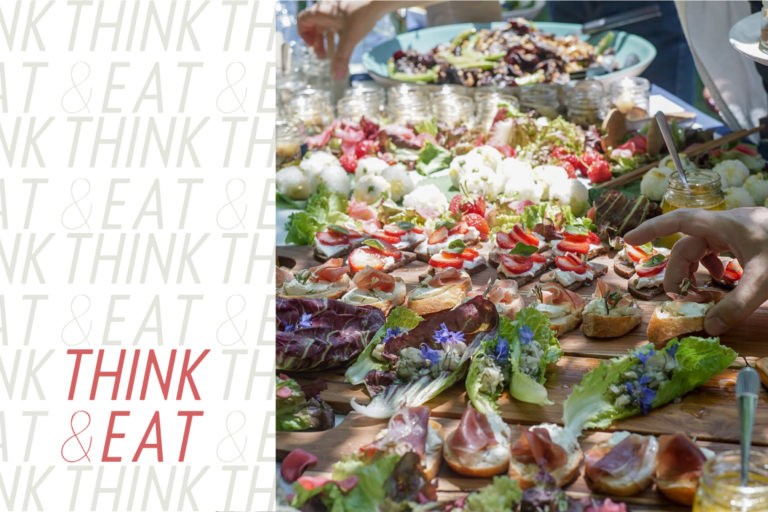 Sharing the Thoughts of Farmers: A Catering Service Featuring Imperfect VegetablesNot many people know about a mottainai, or “no-waste,” catering service that operates in the Shonan area of Kanagawa Prefecture. Launched back in 2019 by FARM CANNING, a company based in the city of Zushi, the service uses organic and pesticide-free imperfect vegetables. It has been gaining increasing popularity, most likely due to the growing demand for vegetarian options. With the mission of supporting farmers, the company continues to improve its catering service.
Sharing the Thoughts of Farmers: A Catering Service Featuring Imperfect VegetablesNot many people know about a mottainai, or “no-waste,” catering service that operates in the Shonan area of Kanagawa Prefecture. Launched back in 2019 by FARM CANNING, a company based in the city of Zushi, the service uses organic and pesticide-free imperfect vegetables. It has been gaining increasing popularity, most likely due to the growing demand for vegetarian options. With the mission of supporting farmers, the company continues to improve its catering service. -
Recipe
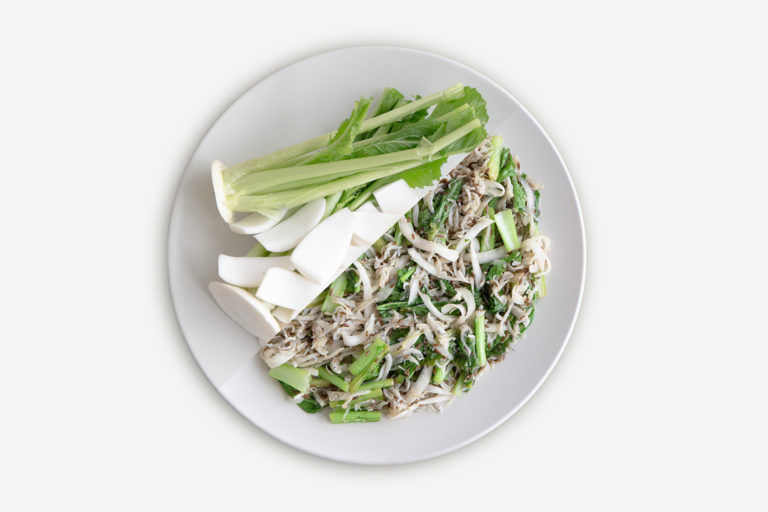 ACHAR: TURNIP PEEL AND LEAVESWhile the leaves are often utilized, the peel is often discarded. However, using turnip peel can help reduce food waste. The THINK & EAT editorial team has crafted a creative recipe that incorporates this frequently overlooked ingredient. Achar is a traditional pickle hailing from India and South Asia. We've created a crunchy achar by incorporating seasonings commonly used in Japanese kitchens.
ACHAR: TURNIP PEEL AND LEAVESWhile the leaves are often utilized, the peel is often discarded. However, using turnip peel can help reduce food waste. The THINK & EAT editorial team has crafted a creative recipe that incorporates this frequently overlooked ingredient. Achar is a traditional pickle hailing from India and South Asia. We've created a crunchy achar by incorporating seasonings commonly used in Japanese kitchens. -
Product
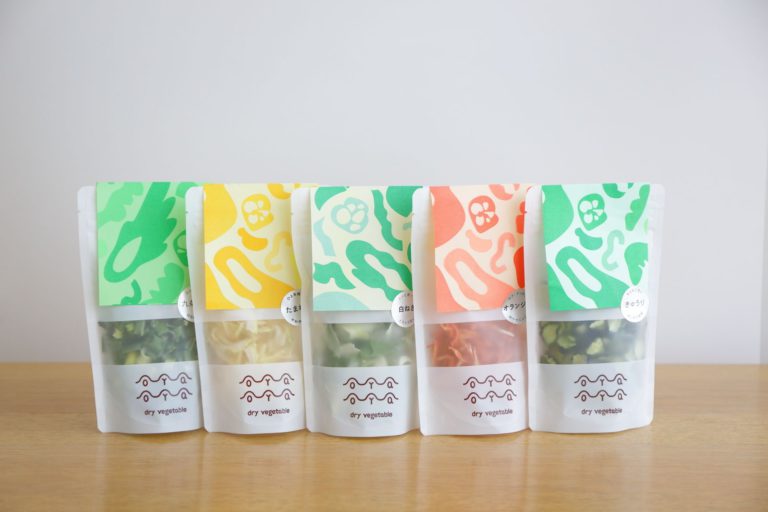 Changing the Image of Imperfect Produce—Packed with Umami OYAOYA Dried VegetablesOYAOYA is a Kyoto-born brand of dried vegetables produced by Agriture Inc. The brand boasts a lineup of a variety of products, and their online shop is lined with vivid packaging. Each product uses imperfect vegetables. Their flavor, which becomes more concentrated in the drying process, wows even professional chefs. The brand has been steadily expanding its reach beyond the domestic market.
Changing the Image of Imperfect Produce—Packed with Umami OYAOYA Dried VegetablesOYAOYA is a Kyoto-born brand of dried vegetables produced by Agriture Inc. The brand boasts a lineup of a variety of products, and their online shop is lined with vivid packaging. Each product uses imperfect vegetables. Their flavor, which becomes more concentrated in the drying process, wows even professional chefs. The brand has been steadily expanding its reach beyond the domestic market. -
Product
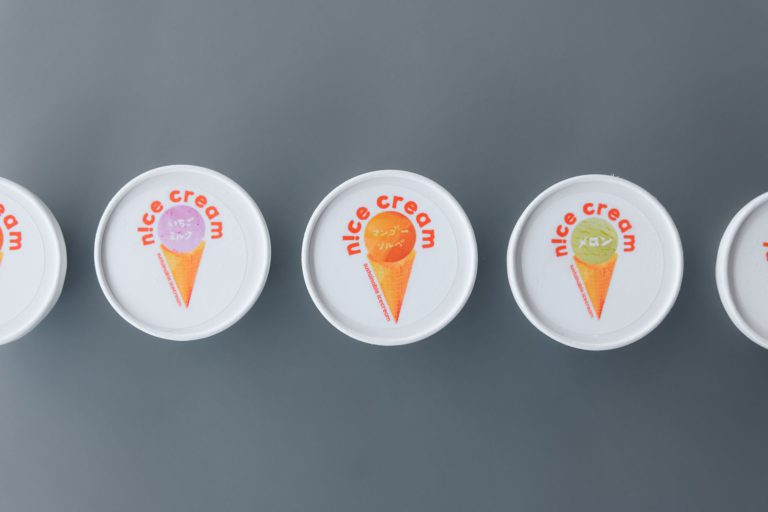 “n!ce cream,” a “Nice” Ice Cream Designed to Reduce Food Wasten!ce cream is an ice cream brand that was launched in 2023. It uses fruits and vegetables that have fallen outside of shipping standards and have nowhere to go, as well as surplus raw milk. We interviewed the director, Hatsumi Kishi, to learn more about how the ice cream was created and to get her thoughts on the product.
“n!ce cream,” a “Nice” Ice Cream Designed to Reduce Food Wasten!ce cream is an ice cream brand that was launched in 2023. It uses fruits and vegetables that have fallen outside of shipping standards and have nowhere to go, as well as surplus raw milk. We interviewed the director, Hatsumi Kishi, to learn more about how the ice cream was created and to get her thoughts on the product. -
Product
 “Tekika Jutaro Hazy IPA,” a Craft Beer That Utilizes the Unique Characteristics of Rejected FruitsTiels Brewing, located in Mishima in Shizuoka Prefecture, is a craft brewery that brews beers using ingredients such as thinned fruits or vegetables that have failed to meet the size specifications. One of their most popular brews is Tekika Jutaro Hazy IPA, made with rejected Jutaro mandarin oranges.
“Tekika Jutaro Hazy IPA,” a Craft Beer That Utilizes the Unique Characteristics of Rejected FruitsTiels Brewing, located in Mishima in Shizuoka Prefecture, is a craft brewery that brews beers using ingredients such as thinned fruits or vegetables that have failed to meet the size specifications. One of their most popular brews is Tekika Jutaro Hazy IPA, made with rejected Jutaro mandarin oranges. -
Product
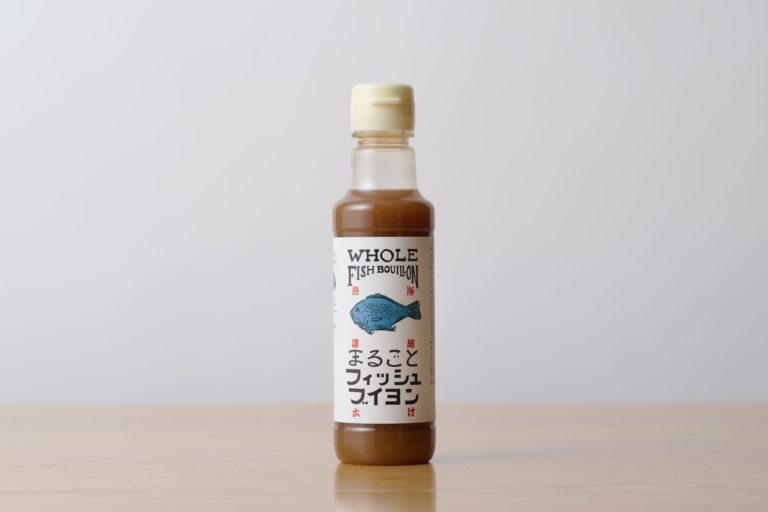 Upcycled Dashi Whole Fish Bouillon Made from Atami’s Underutilized FishAtami is a popular tourist destination that attracts three million visitors annually. The Sagami Sea, which yields approximately 1,500 varieties of fish, is one of Japan’s most bountiful seas. However, locally, it is not widely known that the area produces many underutilized fish that do not reach the market. This issue covers the story of Whole Fish Bouillon, a product made with underutilized fish.
Upcycled Dashi Whole Fish Bouillon Made from Atami’s Underutilized FishAtami is a popular tourist destination that attracts three million visitors annually. The Sagami Sea, which yields approximately 1,500 varieties of fish, is one of Japan’s most bountiful seas. However, locally, it is not widely known that the area produces many underutilized fish that do not reach the market. This issue covers the story of Whole Fish Bouillon, a product made with underutilized fish. -
Project
 The Omi Merchants and the Philosophy of “Three-Way Satisfaction”: Yoshio Fermented Foods’ Initiative to Preserve the Blessings of Lake Biwa in a New FormMr. Yoshio Okumura is the second-generation owner of Okumura Tsukudani, a company that specializes in selling freshwater fish from Lake Biwa. He launched “Yoshio Fermented Foods,” a project based on his own name, to collaborate with culinary creators to use up any unsold, leftover fish. Innovative products with inspiring backstories usually elevate discarded food items into something unique and serve as a means of transmitting Shiga’s traditional cuisine to the future.
The Omi Merchants and the Philosophy of “Three-Way Satisfaction”: Yoshio Fermented Foods’ Initiative to Preserve the Blessings of Lake Biwa in a New FormMr. Yoshio Okumura is the second-generation owner of Okumura Tsukudani, a company that specializes in selling freshwater fish from Lake Biwa. He launched “Yoshio Fermented Foods,” a project based on his own name, to collaborate with culinary creators to use up any unsold, leftover fish. Innovative products with inspiring backstories usually elevate discarded food items into something unique and serve as a means of transmitting Shiga’s traditional cuisine to the future. -
Product
 Nutrient-Rich Sake Lees for Modern Diets. Fermented Mayo Transforms Food Ingredients Destined for the Bins.Oga in Akita Prefecture is famous for the Namahage, a listed UNESCO Intangible Cultural Heritage. There is a lot of buzz around Fermented Mayo created by Ine to Agave, a craft sake brewery in the city. The product features sake lees. Sake lees, which would normally be discarded at a rate of 400 tons per year in Akita Prefecture alone, have been turned into a seasoning that may be easily consumed in today’s homes.
Nutrient-Rich Sake Lees for Modern Diets. Fermented Mayo Transforms Food Ingredients Destined for the Bins.Oga in Akita Prefecture is famous for the Namahage, a listed UNESCO Intangible Cultural Heritage. There is a lot of buzz around Fermented Mayo created by Ine to Agave, a craft sake brewery in the city. The product features sake lees. Sake lees, which would normally be discarded at a rate of 400 tons per year in Akita Prefecture alone, have been turned into a seasoning that may be easily consumed in today’s homes. -
Product
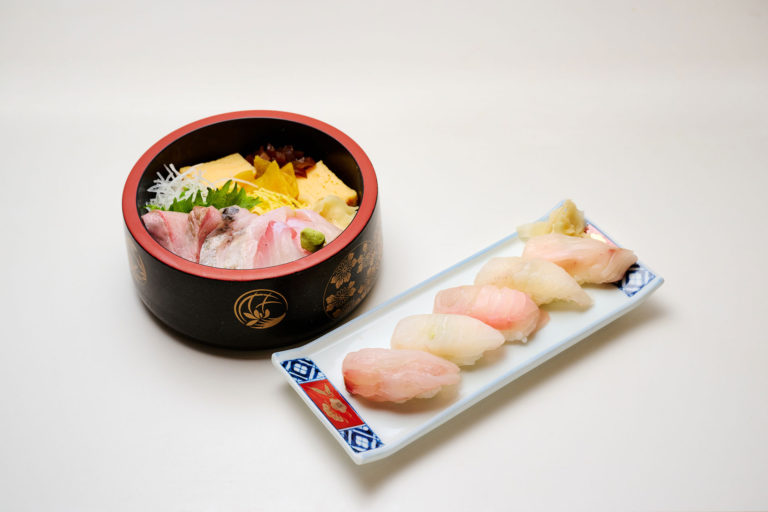 Try Sushi Made with Underutilized Fish by a Chef with 60 Years of ExperienceThe small sizes and low profile of underutilized fish mean that they never make it to market. Osakana Club Hama is a unique sushi restaurant located on the Kashiwa Campus of the University of Tokyo that specializes in serving such fish as sushi. The proprietor has sixty years of experience as a sushi chef. We asked him why he decided to use underutilized fish.
Try Sushi Made with Underutilized Fish by a Chef with 60 Years of ExperienceThe small sizes and low profile of underutilized fish mean that they never make it to market. Osakana Club Hama is a unique sushi restaurant located on the Kashiwa Campus of the University of Tokyo that specializes in serving such fish as sushi. The proprietor has sixty years of experience as a sushi chef. We asked him why he decided to use underutilized fish. -
Project
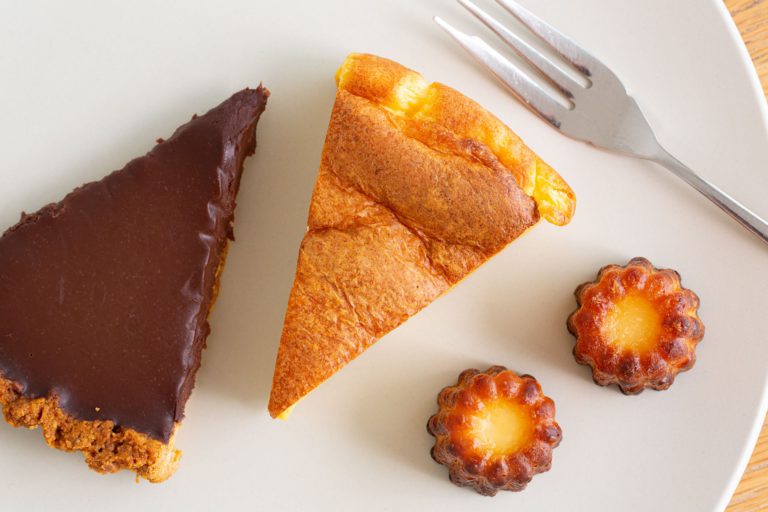 Student-Led Off-Spec Vegetable Café Salle à Manger TokaiCafé Salle à Manger is run by students of the Tokai Gakuin University Department of Nutrition and Dietic Science. Some of the vegetables carefully grown on rented abandoned farmland by students are deemed unsellable but are used in dishes and desserts. They not only convey the taste of the season but also the importance of tackling food waste.
Student-Led Off-Spec Vegetable Café Salle à Manger TokaiCafé Salle à Manger is run by students of the Tokai Gakuin University Department of Nutrition and Dietic Science. Some of the vegetables carefully grown on rented abandoned farmland by students are deemed unsellable but are used in dishes and desserts. They not only convey the taste of the season but also the importance of tackling food waste. -
Project
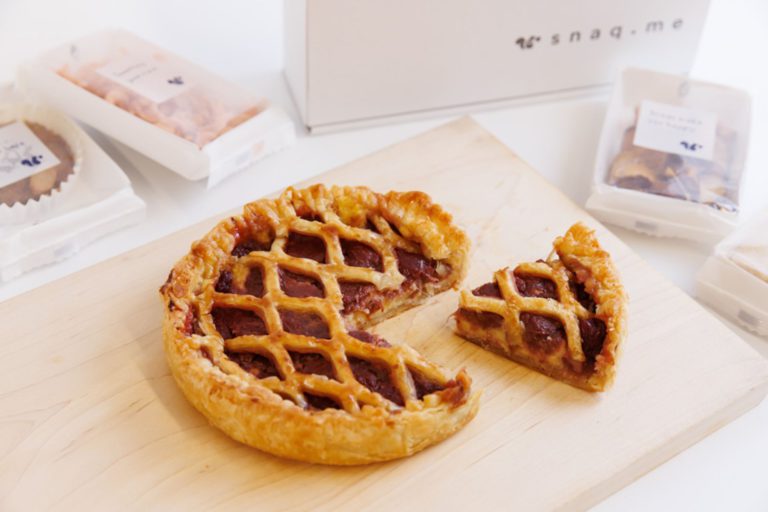 Upcycled Snack Project: A Mighty Ally for Troubled ProducersSnaq Me offers a snack subscription service and promotes the "Upcycled Snack Project," utilizing ingredients that would otherwise go to waste, due to close ties with producers. It develops a range of snacks in response to sudden requests from producers.
Upcycled Snack Project: A Mighty Ally for Troubled ProducersSnaq Me offers a snack subscription service and promotes the "Upcycled Snack Project," utilizing ingredients that would otherwise go to waste, due to close ties with producers. It develops a range of snacks in response to sudden requests from producers. -
Project
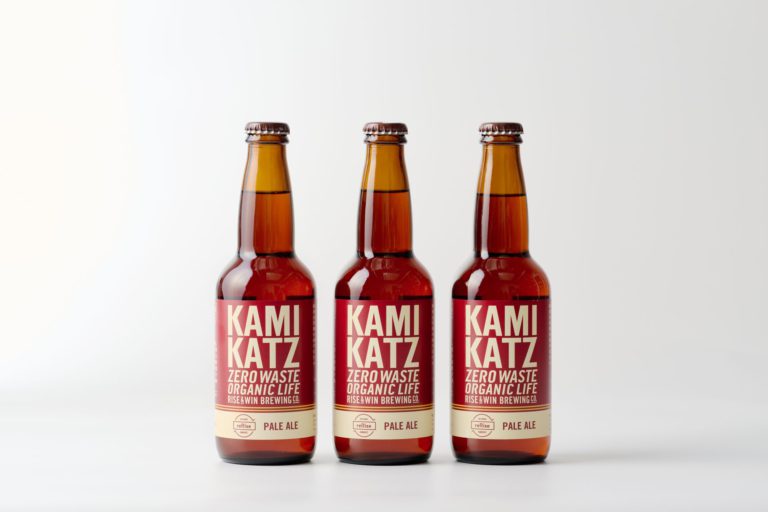 Bringing Life to Zero-Waste Town. Community-Based, Recycling-Oriented Brewing.Kamikatsu-cho, Tokushima Prefecture, is the smallest town in Japan's Shikoku region, and has a population of about 1,400. It is globally known as Japan's first town to make a "zero waste" declaration in 2003. The term "zero waste" refers to achieving a society that produces no waste. RISE & WIN Brewing Co. was established to bring life to a town facing depopulation, where more than half of its residents are elderly. The brewery has gained attention for beer brewing that would only be possible in a zero-waste town, such as using farm produce that would normally be discarded and recycling malt lees to make beer.
Bringing Life to Zero-Waste Town. Community-Based, Recycling-Oriented Brewing.Kamikatsu-cho, Tokushima Prefecture, is the smallest town in Japan's Shikoku region, and has a population of about 1,400. It is globally known as Japan's first town to make a "zero waste" declaration in 2003. The term "zero waste" refers to achieving a society that produces no waste. RISE & WIN Brewing Co. was established to bring life to a town facing depopulation, where more than half of its residents are elderly. The brewery has gained attention for beer brewing that would only be possible in a zero-waste town, such as using farm produce that would normally be discarded and recycling malt lees to make beer. -
Product
 Japanese Menma Saves Untamed Bamboo Groves. Nobeoka Menma Made of Off-Spec Bamboo ShootsNobeoka, MIYAZAKI Prefecture, the second largest municipality in Kyushu, has mountains and forests covering more than 80% of its land area. However, the neglected bamboo groves are causing problems in the city. Nobeoka Menma was created to address this issue.
Japanese Menma Saves Untamed Bamboo Groves. Nobeoka Menma Made of Off-Spec Bamboo ShootsNobeoka, MIYAZAKI Prefecture, the second largest municipality in Kyushu, has mountains and forests covering more than 80% of its land area. However, the neglected bamboo groves are causing problems in the city. Nobeoka Menma was created to address this issue. -
Product
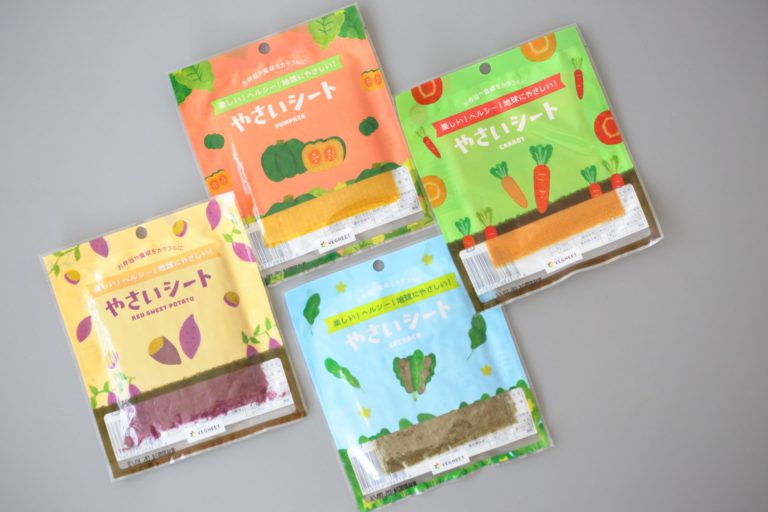 Easing the Food Crisis with Food Sheets. VEGHEET Addresses Social IssuesVEGHEET was conceived in Hirado, a town of about 30,000 inhabitants in Nagasaki Prefecture. The vegetable-based food sheets have their natural colors, nutritional value, and smooth texture intact, offering solutions to various social issues. We spoke to the representative, Keisuke Soda.
Easing the Food Crisis with Food Sheets. VEGHEET Addresses Social IssuesVEGHEET was conceived in Hirado, a town of about 30,000 inhabitants in Nagasaki Prefecture. The vegetable-based food sheets have their natural colors, nutritional value, and smooth texture intact, offering solutions to various social issues. We spoke to the representative, Keisuke Soda. -
Project
 Addressing the Challenges of Farming with Homemade Pickles from a Farmer and a Curry HouseRe: pickles are homemade by Wakamatsu Farm. The jars are crammed with small cucumbers, making one's mouth water. These cucumbers are actually off-spec vegetables that would normally be discarded. Although they may not have a clear market value, their worth is evident when they are utilized to make pickles.
Addressing the Challenges of Farming with Homemade Pickles from a Farmer and a Curry HouseRe: pickles are homemade by Wakamatsu Farm. The jars are crammed with small cucumbers, making one's mouth water. These cucumbers are actually off-spec vegetables that would normally be discarded. Although they may not have a clear market value, their worth is evident when they are utilized to make pickles. -
Project
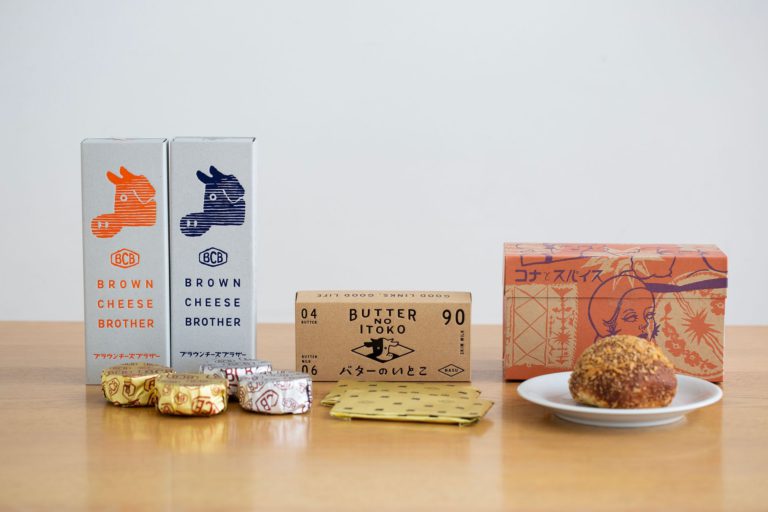 New Value for Fat-Free Milk and Whey. GOOD NEWS’ Passion for Product DevelopmentGOOD NEWS Co., Ltd. is dedicated to resolving local issues and creating a sustainable town in Nasu. It manages the GOOD NEWS complex in Nasu Kogen and creates food products that help tackle food waste. Its Butter no Itoko, made from fat-free milk, is a beloved snack and has earned recognition as Nasu's latest specialty confection.
New Value for Fat-Free Milk and Whey. GOOD NEWS’ Passion for Product DevelopmentGOOD NEWS Co., Ltd. is dedicated to resolving local issues and creating a sustainable town in Nasu. It manages the GOOD NEWS complex in Nasu Kogen and creates food products that help tackle food waste. Its Butter no Itoko, made from fat-free milk, is a beloved snack and has earned recognition as Nasu's latest specialty confection. -
Product
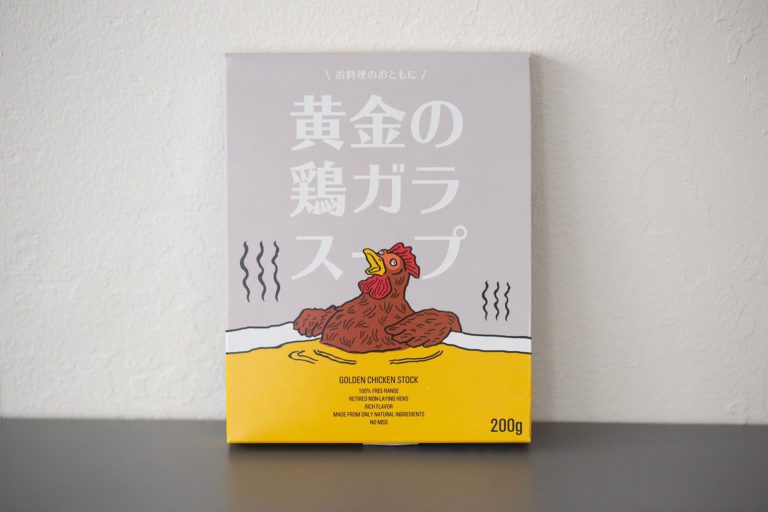 Golden Chicken Stock — Savor the Latent Power of Retired ChickensGolden Chicken Stock, sold by Niwatori Kakumeidan, was developed in response to the concerns of a friend who runs a small-scale poultry farm. The result is a rich, full-bodied, tasty broth made from egg-laying hens considered unsuitable for cooking.
Golden Chicken Stock — Savor the Latent Power of Retired ChickensGolden Chicken Stock, sold by Niwatori Kakumeidan, was developed in response to the concerns of a friend who runs a small-scale poultry farm. The result is a rich, full-bodied, tasty broth made from egg-laying hens considered unsuitable for cooking. -
Project
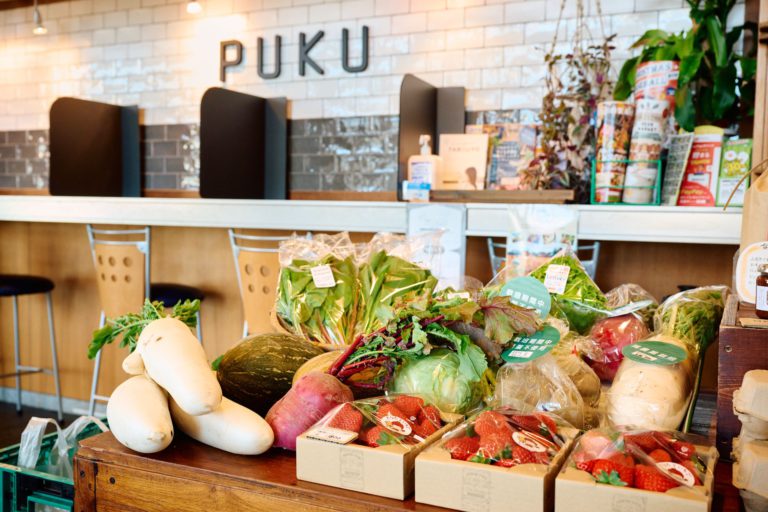 Characterful and “Arty Vegetables” Enliven the Future of Off-Spec Produce“Chibavege” is a food waste reduction project primarily operating in Chiba Prefecture. It all began to support the farmers affected by Typhoon No. 15 in 2019. The group started retailing vegetables and is now venturing into processed food production. Through “arty vegetables” that do not reach the market, they are pursuing a new way of using off-spec vegetables.
Characterful and “Arty Vegetables” Enliven the Future of Off-Spec Produce“Chibavege” is a food waste reduction project primarily operating in Chiba Prefecture. It all began to support the farmers affected by Typhoon No. 15 in 2019. The group started retailing vegetables and is now venturing into processed food production. Through “arty vegetables” that do not reach the market, they are pursuing a new way of using off-spec vegetables. -
People
 Delicious and Cute"Pop"Ice Creams Made by Seika Micotoya with Wasted IngredientsUmegaoka, Aoba Ward, Kanagawa Prefecture. Seika Micotoya is housed in a striking brick building, Micotoya House, in a quiet residential neighborhood. In addition to selling vegetables, the adjoining KIKI NATURAL ICECREAM sells ice creams made from fruits and vegetables salvaged from farmers that would otherwise be wasted. They always have about 10 flavors, and each one is tantalizing not only for its flavor but also for the story behind the ingredients. We spoke with Teppei Suzuki, the proprietor behind these ice cream creations.
Delicious and Cute"Pop"Ice Creams Made by Seika Micotoya with Wasted IngredientsUmegaoka, Aoba Ward, Kanagawa Prefecture. Seika Micotoya is housed in a striking brick building, Micotoya House, in a quiet residential neighborhood. In addition to selling vegetables, the adjoining KIKI NATURAL ICECREAM sells ice creams made from fruits and vegetables salvaged from farmers that would otherwise be wasted. They always have about 10 flavors, and each one is tantalizing not only for its flavor but also for the story behind the ingredients. We spoke with Teppei Suzuki, the proprietor behind these ice cream creations. -
Product
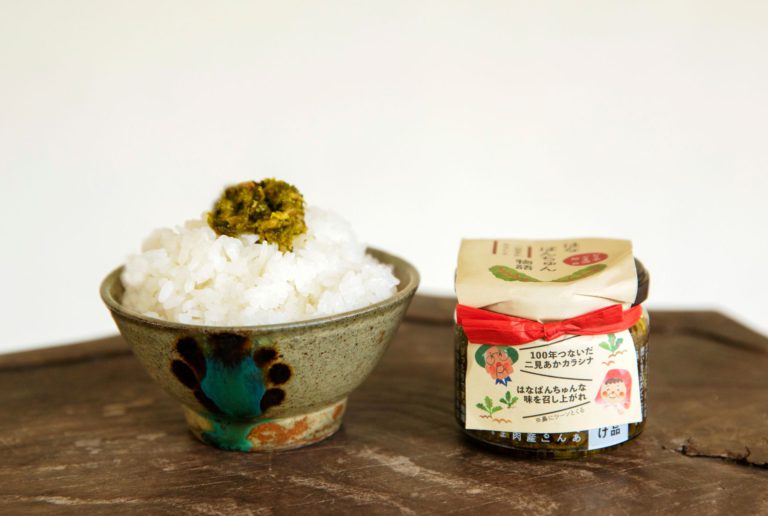 Heirloom Vegetable for the Future. Futami Akakarashina’s Hanapanchun MonogatariWansaka Oura Park in Nago, Okinawa Prefecture, is a seaside farmers’ market jointly established by 10 nearby villages. The famous local specialty, Hanapanchun Monogatari, was developed here to tell the timeless story of the traditional vegetable Futami akakarashina (red mustard greens).
Heirloom Vegetable for the Future. Futami Akakarashina’s Hanapanchun MonogatariWansaka Oura Park in Nago, Okinawa Prefecture, is a seaside farmers’ market jointly established by 10 nearby villages. The famous local specialty, Hanapanchun Monogatari, was developed here to tell the timeless story of the traditional vegetable Futami akakarashina (red mustard greens). -
Project
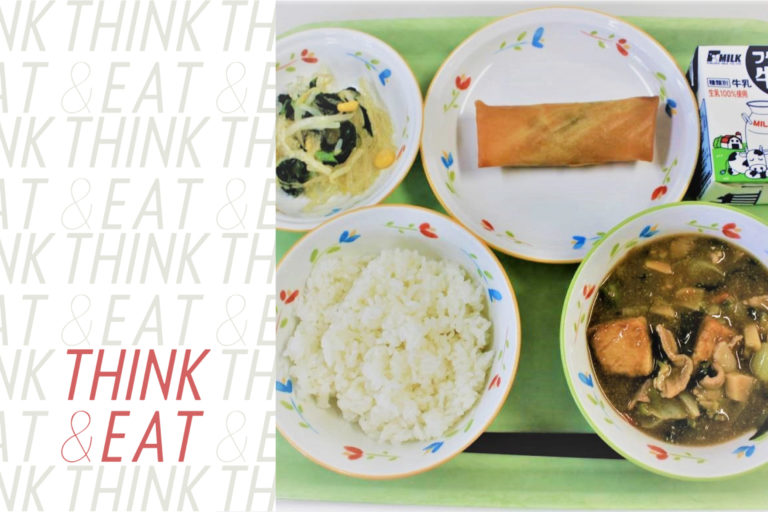 Delicious School Lunches in Fukuroi, Where Local Products Are Used Without WasteIn Fukuroi, Shizuoka Prefecture, school lunches using locally grown produce are now being provided to elementary and middle schools in the city. While it will take nearly 20 years for it to spread throughout the community, thousands of kilograms of vegetables were being discarded each year. The city has been taking measures to prevent food waste since around 2015 to address this issue. Initiatives to improve storage facilities and develop recipes have steadily produced results.
Delicious School Lunches in Fukuroi, Where Local Products Are Used Without WasteIn Fukuroi, Shizuoka Prefecture, school lunches using locally grown produce are now being provided to elementary and middle schools in the city. While it will take nearly 20 years for it to spread throughout the community, thousands of kilograms of vegetables were being discarded each year. The city has been taking measures to prevent food waste since around 2015 to address this issue. Initiatives to improve storage facilities and develop recipes have steadily produced results. -
People
 Packed with Aizu Wakamatsu’s Tasty Delights. Upcycled Beer Made by a Tomato FarmerBeer lovers go crazy for unique craft beers. CheapChic Brewing in Aizu-Wakamatsu, Fukushima Prefecture, is another quirky craft beer brand launched by a tomato farmer. Their current project involves making upcycled beer from wasted fruits and vegetables. We visited Yuki Otomo, the project's representative, to find out what it was all about.
Packed with Aizu Wakamatsu’s Tasty Delights. Upcycled Beer Made by a Tomato FarmerBeer lovers go crazy for unique craft beers. CheapChic Brewing in Aizu-Wakamatsu, Fukushima Prefecture, is another quirky craft beer brand launched by a tomato farmer. Their current project involves making upcycled beer from wasted fruits and vegetables. We visited Yuki Otomo, the project's representative, to find out what it was all about. -
Product
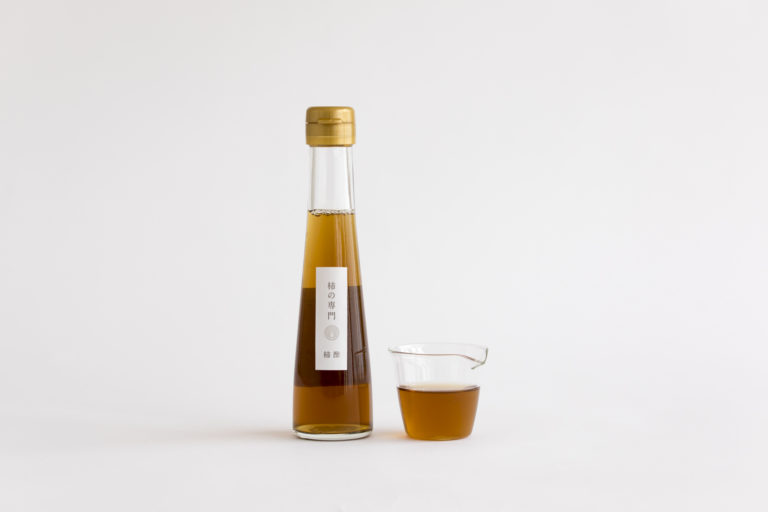 Pure Persimmon Vinegar, developed to Salvage Substandard PersimmonsJun Kakisu is the signature product of Kaki no Senmon Ishii in Gojo, Nara Prefecture, and has been developed with the desire to "salvage persimmons from being discarded in large quantities." It has been a long seller for over 40 years, and substandard persimmons are also used in products such as pickles and wagashi (Japanese confectionery).
Pure Persimmon Vinegar, developed to Salvage Substandard PersimmonsJun Kakisu is the signature product of Kaki no Senmon Ishii in Gojo, Nara Prefecture, and has been developed with the desire to "salvage persimmons from being discarded in large quantities." It has been a long seller for over 40 years, and substandard persimmons are also used in products such as pickles and wagashi (Japanese confectionery). -
Product
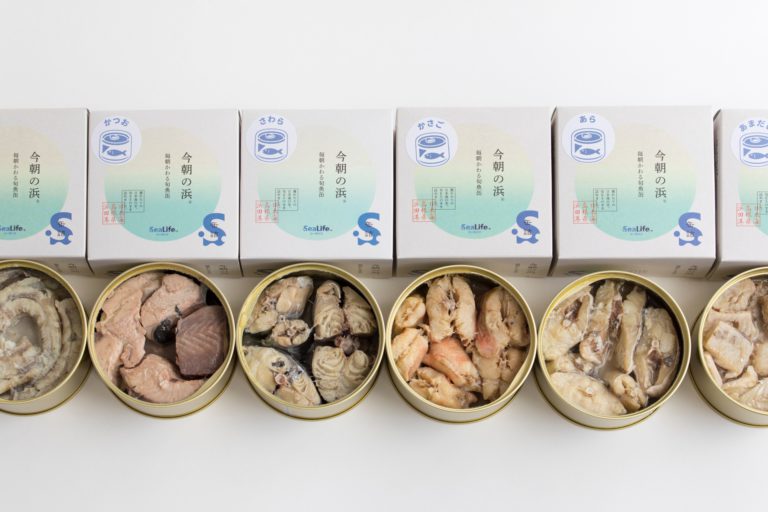 Kesa-no-Hama, a Can of Freshly-Caught Underutilized FishKesa-no-Hama is a can of fish cooked in water produced by Sea Life, a marine products processor in Hamada, Shimane Prefecture. The can contains randomly selected underutilized fish unloaded at a local fishing port. Why did Sea Life focus on underutilized and neglected fish? Tracing how the development of this product reveals the passion of a local manufacturer that supports the fishing industry.
Kesa-no-Hama, a Can of Freshly-Caught Underutilized FishKesa-no-Hama is a can of fish cooked in water produced by Sea Life, a marine products processor in Hamada, Shimane Prefecture. The can contains randomly selected underutilized fish unloaded at a local fishing port. Why did Sea Life focus on underutilized and neglected fish? Tracing how the development of this product reveals the passion of a local manufacturer that supports the fishing industry. -
Product
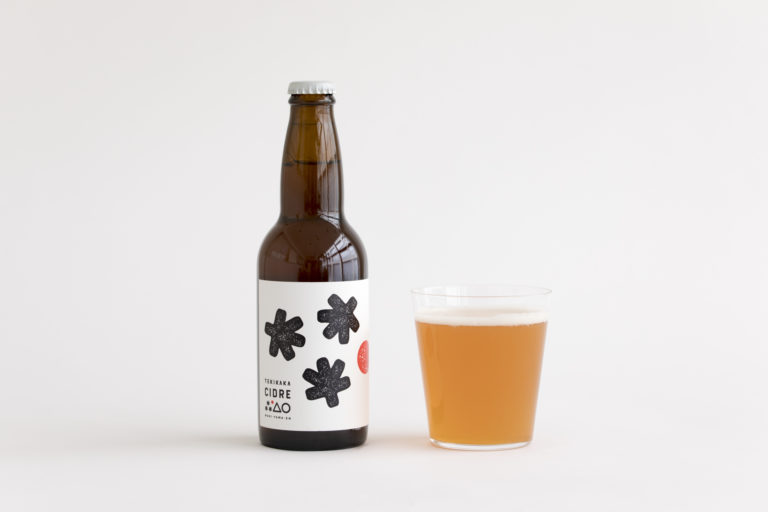 Tekikaka Cider, Made of Discarded ApplesTekikaka Cider is an apple cider made of thinned apples that would normally be discarded. MORIYAMAEN, the first apple orchard in Japan to successfully develop this product, has a history dating back over 100 years in Hirosaki, Aomori Prefecture. Behind the development lies an exceptional drive to make the most of the working hours of fruit picking.
Tekikaka Cider, Made of Discarded ApplesTekikaka Cider is an apple cider made of thinned apples that would normally be discarded. MORIYAMAEN, the first apple orchard in Japan to successfully develop this product, has a history dating back over 100 years in Hirosaki, Aomori Prefecture. Behind the development lies an exceptional drive to make the most of the working hours of fruit picking. -
Project
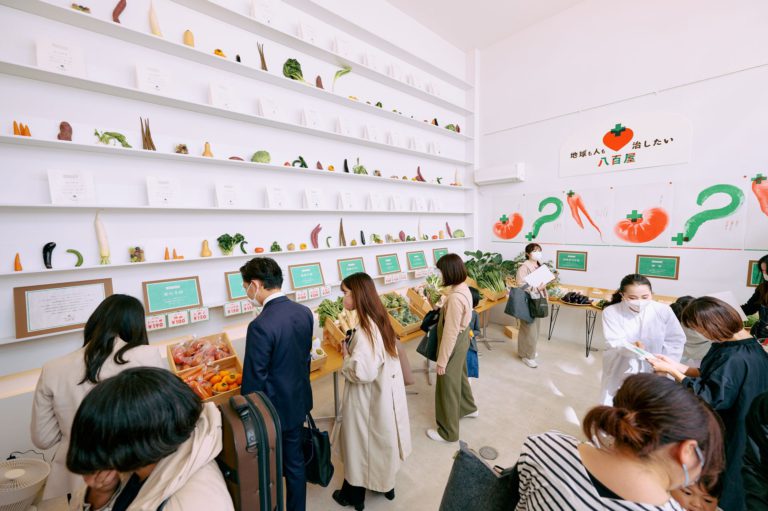 Fortune in Leftovers—Fuku Gohan Project Saves Off-Spec VeggiesThe Fuku Gohan Project was launched in 2019. With the slogan, "There's good fortune in the last helping," the project aims to tackle the problem of food waste. In 2021, it held Green Grocers for Healing the Earth and People, an event using tasty substandard vegetables. The event offered visitors off-spec vegetables normally unavailable in the market and recommended and sold them according to the visitors' physical condition.
Fortune in Leftovers—Fuku Gohan Project Saves Off-Spec VeggiesThe Fuku Gohan Project was launched in 2019. With the slogan, "There's good fortune in the last helping," the project aims to tackle the problem of food waste. In 2021, it held Green Grocers for Healing the Earth and People, an event using tasty substandard vegetables. The event offered visitors off-spec vegetables normally unavailable in the market and recommended and sold them according to the visitors' physical condition.


